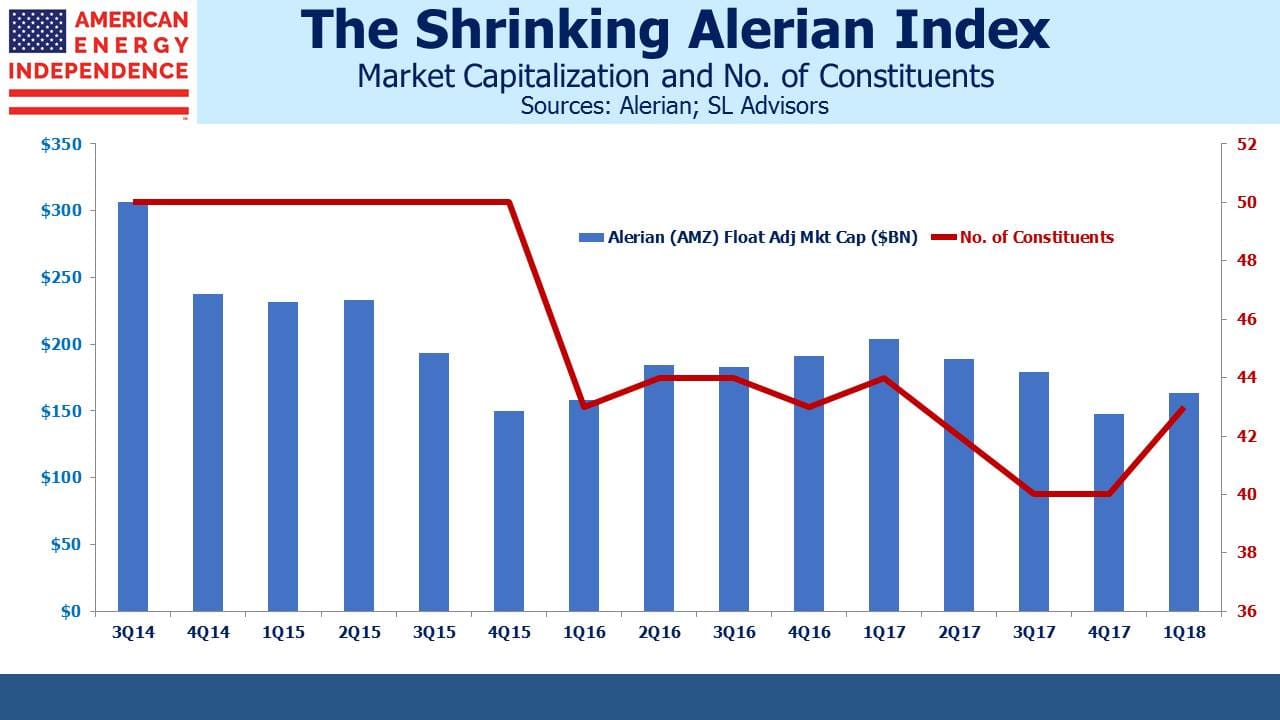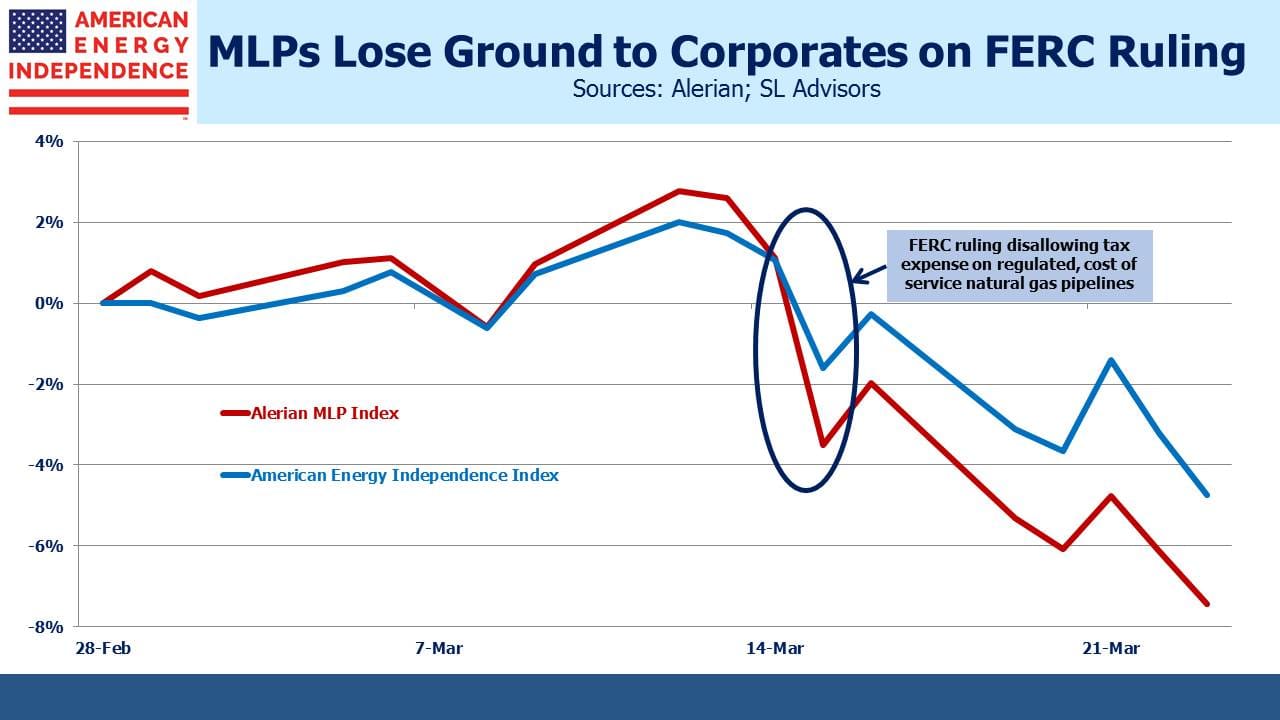Are MLPs Going Away?
MLP investors have certainly seen their conviction tested of late. Poor stock performance was recently compounded by the Federal Energy Regulatory Commission’s (FERC) ruling on cost of service contracts earlier this month. Although MLPs don’t pay tax, interstate natural gas pipeline tariffs based on cost-of-service have historically included an allowance for taxes paid by their investors. Following a court challenge by United Airlines, FERC has now disallowed this practice.
Since last year’s tax reform, MLPs have already included lower imputed tax expense in their guidance. After the FERC ruling, most firms reaffirmed prior guidance, since the immediate impact of the change is quite narrow. However, the loss of the tax allowance will impact gradually over the next few years. Along with the drop in the corporate tax rate from 35% to 21%, it further reduces the relative advantage of MLPs compared with corporate ownership of energy infrastructure assets.
The trend favoring corporate ownership is well established. As we’ve written before, MLP investors (generally, older wealthy Americans) want their distributions and don’t much care for the distribution cuts that have been necessary to finance growth projects (see Will MLP Distribution Cuts Pay Off?). These investors are income-seeking, not total return oriented. It’s why MLP yields remain stubbornly high, and is behind the many “simplification” transactions that move assets to corporate ownership and cut payouts.
FERC’s ruling probably helps that ongoing trend towards corporations (see FERC Ruling Pushes Pipelines Out of MLPs). MLPs are complex, with a limited investor base, and are losing some of their comparative advantage over corporations because of changes to the tax code. They already represent less than half of energy infrastructure. The tax ruling by FERC doesn’t affect corporate owners, since their tax expense is real, not imputed as was the case with MLPs.
If you’re a direct holder of MLPs, as long as the assets continue to perform there’s not much reason to do anything. You may ultimately wind up owning shares in a corporation if the MLP converts, and it might even be acquired. The tax consequence of waiting is likely no worse than selling your MLP today.
However, investors in many MLP-dedicated funds that are not RIC-compliant face a real dilemma. As the number of MLPs contracts, these funds will struggle to find enough names to own. The Alerian Index has been shrinking for some time, both in market cap and constituents. Investors in the wrong kind of fund face a corporate tax haircut as well as a declining opportunity set.
There’s some recent evidence since the FERC ruling that investors are starting to favor corporate infrastructure names over MLPs. So far in March, the American Energy Independence Index, which consists of broad energy infrastructure exposure with only 20% in MLPs, has handily outperformed the more narrow, MLP-dedicated Alerian Index by 2.7%. This outperformance has come since the FERC ruling. Anecdotally, we know some investors are switching from tax-paying funds into pass-through, RIC-compliant ones because that’s all we offer and we are seeing the inflows.
Since last Summer, we calculate that tax-impaired funds have seen net outflows, as investors have become more aware of the performance drag (see AMLP’s Tax Bondage) and the shrinking opportunity set. Meanwhile, properly structured RIC-compliant funds with no tax drag picked up almost $900MM over this time. It’s reflected in the shrinking float-adjusted market capitalization of the constituents of the Alerian Index, which is less than half of its 2014 peak, significantly lower than performance alone would imply.
The number of Alerian constituents has also shrunk noticeably since 2014. Just six names make up half its market cap, and seven have a market cap of below $1BN. Williams Companies (WMB) could well conclude that the FERC ruling means they’re better off owning their sprawling interstate natural gas pipeline network, Transco, at the corporate level, thereby eliminating MLP Williams Partners (WPZ). Enbridge (ENB) could easily absorb the remaining public float of Spectra Energy Partners (SEP) and Enbridge Energy Partners (EEP) to offset FERC’s impact on their cost-of-service tariffs. Plains GP Holdings (PAGP) will eventually covet the tax shield that would come from absorbing the remaining units of its MLP, Plains All American (PAA).
Combined, losing these four would reduce the market cap of the Alerian index by $24BN, about 17%. By comparison, the two new names added in 1Q18 (Hi-Crush Partners and CVR Refining) have a combined market cap of only $1.5BN. The Alerian MLP Index is not what it used to be.
The American Energy Independence Index has a float-adjusted market cap of $315BN, more than twice Alerian, reflecting its broader approach. Investors are starting to take note.
We are invested in ENB, PAGP and WMB
Important Disclosures
The information provided is for informational purposes only and investors should determine for themselves whether a particular service, security or product is suitable for their investment needs. The information contained herein is not complete, may not be current, is subject to change, and is subject to, and qualified in its entirety by, the more complete disclosures, risk factors and other terms that are contained in the disclosure, prospectus, and offering. Certain information herein has been obtained from third party sources and, although believed to be reliable, has not been independently verified and its accuracy or completeness cannot be guaranteed. No representation is made with respect to the accuracy, completeness or timeliness of this information. Nothing provided on this site constitutes tax advice. Individuals should seek the advice of their own tax advisor for specific information regarding tax consequences of investments. Investments in securities entail risk and are not suitable for all investors. This site is not a recommendation nor an offer to sell (or solicitation of an offer to buy) securities in the United States or in any other jurisdiction.
References to indexes and benchmarks are hypothetical illustrations of aggregate returns and do not reflect the performance of any actual investment. Investors cannot invest in an index and do not reflect the deduction of the advisor’s fees or other trading expenses. There can be no assurance that current investments will be profitable. Actual realized returns will depend on, among other factors, the value of assets and market conditions at the time of disposition, any related transaction costs, and the timing of the purchase. Indexes and benchmarks may not directly correlate or only partially relate to portfolios managed by SL Advisors as they have different underlying investments and may use different strategies or have different objectives than portfolios managed by SL Advisors (e.g. The Alerian index is a group MLP securities in the oil and gas industries. Portfolios may not include the same investments that are included in the Alerian Index. The S & P Index does not directly relate to investment strategies managed by SL Advisers.)
This site may contain forward-looking statements relating to the objectives, opportunities, and the future performance of the U.S. market generally. Forward-looking statements may be identified by the use of such words as; “believe,” “expect,” “anticipate,” “should,” “planned,” “estimated,” “potential” and other similar terms. Examples of forward-looking statements include, but are not limited to, estimates with respect to financial condition, results of operations, and success or lack of success of any particular investment strategy. All are subject to various factors, including, but not limited to general and local economic conditions, changing levels of competition within certain industries and markets, changes in interest rates, changes in legislation or regulation, and other economic, competitive, governmental, regulatory and technological factors affecting a portfolio’s operations that could cause actual results to differ materially from projected results. Such statements are forward-looking in nature and involves a number of known and unknown risks, uncertainties and other factors, and accordingly, actual results may differ materially from those reflected or contemplated in such forward-looking statements. Prospective investors are cautioned not to place undue reliance on any forward-looking statements or examples. None of SL Advisors LLC or any of its affiliates or principals nor any other individual or entity assumes any obligation to update any forward-looking statements as a result of new information, subsequent events or any other circumstances. All statements made herein speak only as of the date that they were made. r
Certain hyperlinks or referenced websites on the Site, if any, are for your convenience and forward you to third parties’ websites, which generally are recognized by their top level domain name. Any descriptions of, references to, or links to other products, publications or services does not constitute an endorsement, authorization, sponsorship by or affiliation with SL Advisors LLC with respect to any linked site or its sponsor, unless expressly stated by SL Advisors LLC. Any such information, products or sites have not necessarily been reviewed by SL Advisors LLC and are provided or maintained by third parties over whom SL Advisors LLC exercise no control. SL Advisors LLC expressly disclaim any responsibility for the content, the accuracy of the information, and/or quality of products or services provided by or advertised on these third-party sites.
All investment strategies have the potential for profit or loss. Different types of investments involve varying degrees of risk, and there can be no assurance that any specific investment will be suitable or profitable for a client’s investment portfolio.
Past performance of the American Energy Independence Index is not indicative of future returns.




Leave a Reply
Want to join the discussion?Feel free to contribute!